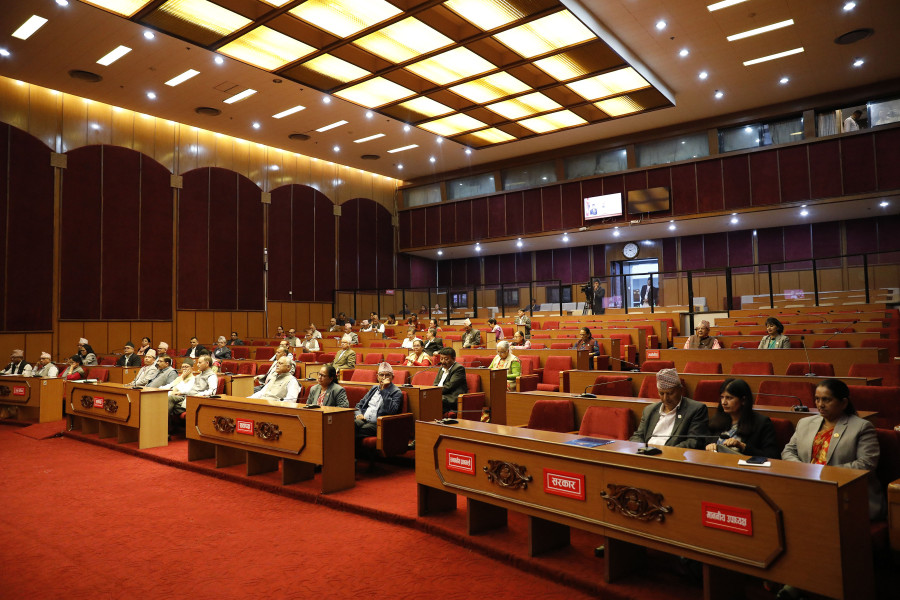National
Federal Civil Service Bill clears final hurdle
Legislation Management Committee of the upper house approves the bill on Tuesday, effectively settling retirement age and cooling-off period disputes.
Purushottam Poudel
The Legislation Management Committee of the National Assembly unanimously passed the Federal Civil Service Bill on Tuesday.
The committee’s meeting at Singha Durbar endorsed the bill with full consensus after an agreement was reached on the retirement age of civil servants.
The bill, already passed by the House of Representatives, provides that the retirement age will remain 58 in the first year after the Civil Service Act comes into effect, 59 in the second year, and 60 from the third year onwards.
Following agreement on all issues, Committee chair Tulasa Kumari Dahal announced that the bill had been unanimously passed.
With this, the government has backed down from the proposal to raise the retirement age of civil servants.
Minister for Federal Affairs and General Administration, Bhagwati Neupane, told the Legislative Committee of the National Assembly on Tuesday that the government would move forward in line with the provisions passed by the House of Representatives.
On Monday, she had proposed setting the retirement age of employees at 59 for the fiscal year in which the law is enacted, but opposition lawmakers opposed.
Following this, Minister Neupane stated that she had no personal stake in the bill and that it was customary to proceed based on consensus. Both the House of Representatives and the Legislative Committee had agreed that the retirement age of employees would remain at 58 years in the fiscal year in which the law takes effect. Lawmakers on the committee had objected, saying the minister had attempted to overturn that arrangement.
In response to the lawmakers who had opposed her proposal, Minister Neupane said she was simply presenting the government’s position, as there had been little discussion on the retirement age issue although everyone put forward their arguments.
Claiming that she had no personal interest in extending the retirement age, Minister Neupane further said she would not serve any vested interests and was committed to the Federal Civil Service Bill as passed.
Stressing the need for a harmonious relationship between the government and civil servants, Minister Neupane clarified that her proposal on retirement age intended to boost the morale of employees, and was not driven by personal motives.
“We held extensive discussions and arguments, and all honourable members expressed their views during the deliberations. On some issues, we reached an understanding, and the government, taking into account the sentiments of the members, adopted a flexible approach,” Minister Neupane said. “There was also much public attention on how the National Assembly would resolve the cooling-off period issue. That too was concluded unanimously.”
The Legislation Management Committee of the National Assembly decided on August 30 to include a cooling-off period in the bill. This provision had become highly controversial after Parliament passed the bill without it.
The National Assembly members from the CPN-UML had registered amendments to the Federal Civil Service Bill, expressing reservations about the cooling-off period provision.
However, after the bill was passed unanimously by the National Assembly committee, UML’s reservations were effectively gone, said Gopal Bhattarai, a National Assembly member of UML.
Earlier, Parliament even formed a probe committee after the cooling-off clause was tampered with secretly and without authorisation. After widespread backlash and criticism over the tampering, Ramhari Khatiwada, the chairman of the State Affairs and Good Governance Committee of the Parliament, resigned on ‘moral grounds’.
The bill includes a cooling-off period provision, which stipulates that a civil servant or a government employee who has resigned or retired shall not be eligible for appointment to any constitutional or government position until two years have passed since their retirement.
The National Assembly has a constitutional deadline of Wednesday (September 3) to endorse the bill and forward it to the lower house.
Now, the upper house panel’s nod to the bill, which was already passed by the House of Representatives, paves the way for the upper house’s endorsement. This bill envisions provincial civil service commissions appointing chief administrative officers in local units under their respective jurisdictions. Until the provinces start their own recruitments, however, the federal government will depute such officers in bulk, and the provincial governments will assign them to local units. This arrangement can continue for a maximum of 10 years, and officers can be transferred between provinces only once during their service period.
The bill also places provincial secretaries under the respective provincial governments, thus addressing a longstanding demand of the provinces. However, for the time being, the federal government will depute them, while principal secretaries overseeing the provincial bureaucracy will remain under the federal government.
The Civil Service Bill was presented in Parliament on March 4, 2024, and passed on June 29 this year, before it was sent to the National Assembly. Once in the National Assembly, it was referred to the Legislative Committee for detailed clause-by-clause deliberations.




 9.7°C Kathmandu
9.7°C Kathmandu














